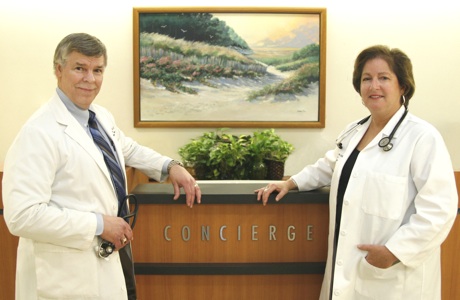

The Virginia Beach Premier Medical NewsletterApril, 2012
VBPM Connection is a newsletter published by Virginia Beach Premier Medical, an internal medicine practice dedicated to personalized, highly attentive, high quality care for our patients. The newsletter provides information of a general nature about our office, current health news and various common illnesses and ailments. None of the information provided is meant to be specific for any particular individual. Always seek the advice of your personal physician for any specific information about your health.
New Treatment for Severe Hypertension
Most patients with high blood pressure are easy to control with one or two medications. There are those, however, in whom blood pressure control is not so easy.
Severe, drug-resistant hypertension refers to high blood pressure that is not well controlled even with multiple medications.
Among other variables, the kidneys and kidney arteries are known to be directly involved in blood pressure control. Changing the constriction of kidney arteries may be a new way of treating this disorder.
Doctors are now investigating a new procedure, which involves using a catheter to apply radiofrequency waves to nerves along the wall of kidney arteries as a way to help control drug-resistant hypertension. The procedure has been associated with significant reductions in BP in many patients within one month and can decrease the adverse cardiac effects of high blood pressure within 6 months. It will likely also reduce the amount of medication a person will have to take for BP control. Future trials of this treatment hopefully will help confirm these effects on improving clinical outcomes. It may prove to be an important new tool in helping those people with high blood pressure who have not achieved good control with medications.
Staph Carriers in Family Members
Chronic or recurring Staph (Staphylococcal) infections of the skin and soft tissues may be perpetuated by family members who are carriers of the bacteria. This results in recurrent hospitalizations and increases the need for repeated use of intravenous antibiotics to control these infections. One study has found that the risk of these recurrent infections may be significantly reduced at least in the short term by using small amounts of mupirocin ointment (Bactroban) applied to the nostrils of all the immediate family members of afflicted patients. To prevent the build up of resistance, however, it should only be used in cases of severe or multiple infections.
Colon Cancer Testing
A new method of detecting colon cancer is currently undergoing research. This method involves testing the stool DNA. It can detect up to 6 different types of cancer-associated genes that are shed off from exfoliated tumor cells. This has been found to be more accurate than fecal occult blood testing and may one day be able to limit the number of people who need colonoscopies.
Alzheimers Treatment
Alzheimer’s treatment remains very limited. A recent study found that Aricept (donepezil) does seem to help slow down the clinical progress of the disease to some extent, although the ultimate outcome remains the same. Adding Namenda (memantine) to Aricept did not provide any benefit, so it doesn’t seem to be necessary to take both drugs. The study also found that even though the Alzheimer’s patient on Aricept may appear to be declining, stopping the Aricept will usually result in an even faster decline than continuing it.
Calcium and Vitamin D
Calcium and Vitamin D supplementation are considered important for good bone health, but recently, a lot of claims have been made that they also help prevent or otherwise affect cancer and vascular disease (and everything else in between). Low Vitamin D levels are often associated with weakness and frailty. However, a recent randomized study by UK researchers found no evidence that either calcium or Vitamin D supplementation have any effect on cancer or vascular risk - one way or the other.
Sleeping Pills
A recent study appearing in the British Medical Journal that caused a significant stir in the news media brought attention to the fact that there seemed to be an increase in all-cause mortality in patients who were prescribed prescription sleeping pills (hypnotics) - like Ambien. This does not mean that the medicines caused the mortality – only that there was an association. It may be that those who took sleeping pills the most had other disorders, like psychiatric problems or other conditions, that contributed to earlier mortality than those who did not take them. There may be genetic predispositions operating such that those who have problems sleeping are more genetically predisposed to other more serious conditions. The answers aren’t clear. Another study needs to be done to see if stopping the hypnotics decreases the mortality rate.
Patient Satisfaction
High levels of patient satisfaction does not always equate to better health care. For some patients, good health care means extensive evaluation of every symptom, which often leads to increased numbers of tests and procedures, some of which may be harmful or risky or lead to increased radiation exposure. An interesting study appearing in the Archives of Internal Medicine found that the most satisfied patients had a 12% higher hospitalization rate, 9% higher prescription drug use, 9% higher total healthcare expenditure and a 26% higher mortality rate than those patients who were least satisfied with their care.
The authors’ explanation for these findings was that sometimes overuse of medical services to satisfy patients may ultimately result in harmful and adverse health outcomes. A prevailing notion among many patients is that “more is better”. However, more testing often leads to more treatments and procedures that are potentially harmful. It takes a wise and thoughtful physician to provide high levels of patient satisfaction, but at the same time, “do no harm”.
Implantable Chips for Medication Delivery
We may be on the verge of changing how medications will be given or taken in the future. Implanted devices (capsules or chips) are being used now that can provide precise amounts of medicine on a continuing basis for months at a time. This is already being done with the hormone testosterone. The capsule can be implanted in men with low testosterone levels and can provide all the testosterone they need for a period of up to six months. A recent study was done using the drug Forteo in the same manner for osteoporosis. The clinical results are the same as if the drugs were given daily or weekly by injection. Some of these devices can even be controlled to release medication wirelessly. Sounds like science fiction, doesn't it?
New Heart "Surgery" Without the Surgery
A new way of doing heart valve “surgery”, called TAVR (Transcatheter Aortic Valve Replacement), is now available in the Hampton Roads area. It allows doctors to replace abnormal heart valves using only a catheter inserted through a small incision in the groin. No general anesthesia or long chest incision is required.
The procedure is currently primarily used for treatment of aortic stenosis (excessive narrowing of the aortic valve) in patients who are high risk and unable to tolerate the bigger operation. There is, of course, the hope that eventually its use could be expanded to replacing other valves and that it could be used in a broader range of patients.
Read more at http://www.harthosp.org/heart/tavr/default.aspx.
Grief Reactions
The loss of a loved one often results in a severe and difficult grief reaction that many of us have had to live through at one time or another to a greater or lesser extent. It usually changes our lives completely to the point where we will never be the same as we were before. The person that we loved, that we depended on, that was always there for us before, is suddenly no longer there. You can’t talk to them any more - can’t even call them on the phone. This loss creates a huge bottomless hole and feeling of emptiness and loneliness. People often have terrible, incapacitating, sensations of emotional and physical weakness and don’t know how it’s possible for them to go on doing the things they’ve been doing, or that they’re expected to do, when they return to their jobs after the funeral.
There is no easy way to get around this. It just takes time to adjust to this different life. Family and friends can help early on, but they will want to get back to normal fairly soon, leaving you alone with your continuing grief. It may take several weeks or months for the severity of these feelings to improve, but they will get better eventually. You just have to keep going – put one foot in front of the other - and keep going. Ultimately, the days will start to get a little easier to get through, and you will slowly heal. If grief remains incapacitating for longer than 6 months, it may be wise to seek some counseling at that point, even sooner if your reaction is severe and renders you nonfunctional. Talk to your doctor about these feelings. An experienced physician who has been through this process many times before with other patients can provide you with compassionate guidance and direction.
About Our Office
Virginia Beach Premier Medical is a membership internal medicine practice specializing in comprehensive and compassionate, individualized and personalized patient-centered care. We pride ourselves on full continuity of care – in the office, in the hospital, or even at home.
Patient Advocacy
The health-care industry is not always conducive to good patient access. A considerable amount of red-tape and bureaucracy have to be waded through to get things done sometimes. Frequently there are scheduling problems, pre-authorizations to be obtained, insurance denials, inadequate information and explanations that are difficult to understand. Helping our patients navigate through this complex medical system that is not always user-friendly is one of the most important services that we can provide. Our doctors and staff at VBPM are experienced in wading through this molasses and navigating the maze to help you get where you need to be. If you would like more information about our practice please call us at 757-416-6750 or visit our website at www.vbpm1.com. Ask to speak with Brittany, our office manager, or Dr. Parks or Dr. Warth. We’d be happy to talk with you anytime.

Happy Spring!!! |



